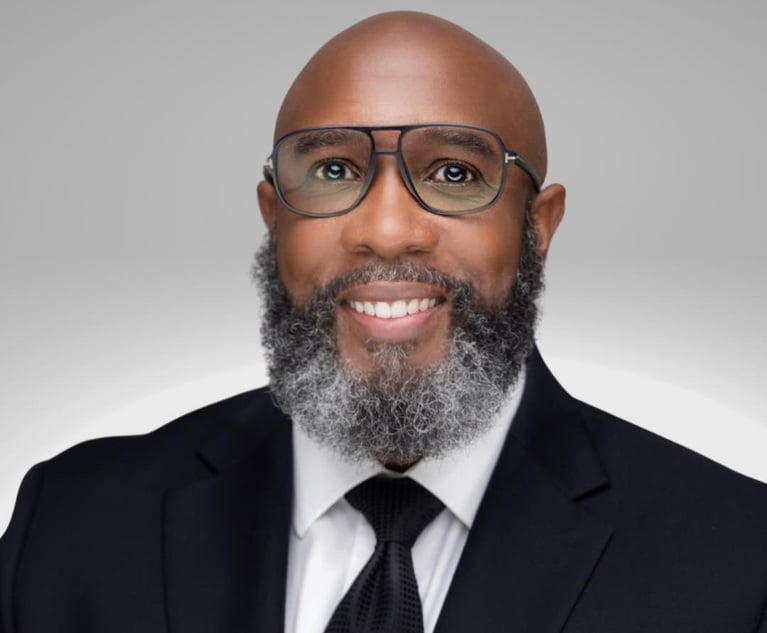Fearless Miami Prosecutor Barbara Martinez is at Home at Holland & Knight
After almost 20 years at the Miami U.S. Attorney's Office, Barbara A. Martinez has joined Holland & Knight, where she'll use her background in human trafficking, child exploitation and white-collar crime prosecutions in ways she never anticipated.
April 03, 2020 at 02:50 PM
9 minute read
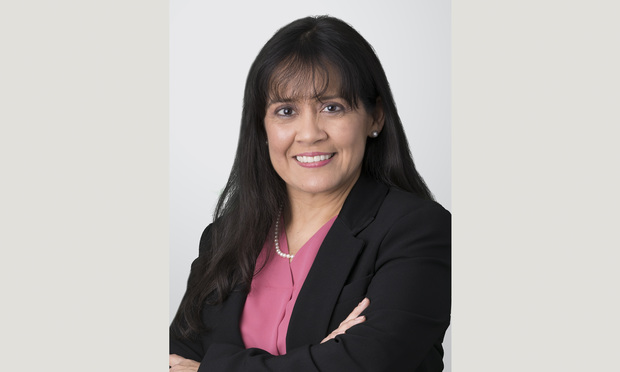 Barbara Martinez, senior consultant to Holland & Knight in Miami.
Barbara Martinez, senior consultant to Holland & Knight in Miami.
After almost 20 years at the Miami U.S. Attorney's Office, Barbara A. Martinez has joined Holland & Knight, where she'll use her background in human trafficking, child exploitation and white-collar crime prosecutions in ways she never anticipated.
A former chief of special prosecutions, Martinez's cut a striking figure in Miami criminal law, having been at the forefront of multiple major cases.
Becoming senior consultant for Holland & Knight's global compliance and investigations team might seem like a huge transition, but it's actually not, according to Martinez.
"I feel like everything that I've done in the past has led me to this point," she said. "The thing about trafficking is a lot of it does involve fraud. It's often about luring people under fraudulent pretenses, and some people go to some pretty elaborate means in order to complete their scam and exploit their victims."
Martinez began advising Holland & Knight clients on white-collar crime issues and commercial compliance with federal and state human trafficking laws in February.
Her legal career has been marked with a fearless ambition, which likely stems from her headstrong mother and grandmother, who made a point of reminding her, "You can do whatever you want" during her childhood in McAllen, Texas.
So, while most of Martinez's fellow law students assumed they'd never get into the Department of Justice in Washington, D.C., she decided to try her luck.
"I think if I had known how competitive things would be, maybe I would have been intimidated by it, but I wasn't because they were so confident in me," she said.
In 1997, Martinez joined the DOJ's Attorney General Honor's Program, where she cut her teeth on criminal fraud cases. Then, yearning to get into the courtroom after about three years of learning the ropes, she transferred to Washington's U.S. Attorney's Office to try her first federal case.
After working with a senior attorney to convict an Indiana couple of defrauding the Department of Education out of about $3 million, Martinez caught the trial bug.
In December 2000, she joined the major crimes section of the U.S. Attorney's Office in Miami, otherwise known as "the place to be" for criminal lawyers, after a friend persuaded her to apply.
And there, Martinez stumbled into what would become a key specialization, as the defendant in her first major case was accused of exploiting children across Latin America. He'd filmed himself sexually abusing the children, edited himself out, then sold the tapes to dozens of pedophiles across the country. He also was HIV-positive.
"This was back in the day when everything was by mail. People weren't doing this online," Martinez said. "So, literally, some of his packages were interjected by the postal service."
Despite that evidence, the defendant refused to plea, and the case went to trial. He was sentenced to 100 years in prison.
Martinez developed her second specialization at the economic crimes section, where she convicted two Miami Beach doctors of an elaborate health care fraud involving IV infusion therapy.
"They were not giving them the medications," Martinez said. "They were giving them saline solution, which is really bad for you, mixed with vitamins, then billing for very expensive medication."
Dozens of federal jury and bench trials later, Martinez was appointed deputy chief of major crimes ad special prosecutions, then chief of special prosecutions, where she supervised prosecutors handling a unique mix of cases, from violent crime and gang cases to international kidnapping, child exploitation and human trafficking.
While at the helm, Martinez prosecuted former Miami Beach police officer Lavont Flanders and his co-defendant Emerson Callum, who tricked more than 50 women into traveling to Miami for modeling auditions, when in reality they would be drugged and raped. The men filmed the attacks and sold them as adult pornography. She also landed Christopher Glenn, a U.S. citizen in Honduras, a life sentence for running a child sex trafficking ring.
It soon became apparent to Martinez that human trafficking cases weren't all that different from white-collar fraud investigations.
"Showing a pattern and showing the things that are out of place and why this isn't a legitimate business model were at the core of our cases," Martinez said. "We also ended up working on a lot of money laundering cases, or adding money laundering to some of these cases to show the full extent of what was happening."
Because the biggest challenge is encouraging survivors to come forward, Martinez said it's crucial to find creative routes in.
"I would often tell prosecutors, 'I know you're looking at it this way because this is the way it's been done before and this is the simplest way, but sometimes the simplest way isn't going to work, so we've got to really think about what else can we do here, what other charges can we bring," Martinez said. "Are we going to try something new?"
In one case Martinez supervised, the defendant claimed he ran a yoga studio and sought students from Kazakhstan to work as receptionists.
"That was obviously not the case," Martinez said. "They were coming to work doing massages in North Bay Village."
Though the students were sexually abused, the case hinged on establishing fraud through records from the Department of State, student visa applications and email communications. To get a conviction, Martinez had prosecutors focus on all the fraudulent efforts the defendant went to to complete his crime.
Martinez hasn't only focused on catching perpetrators after the fact. She's also trained police officers, bank staff, medical professionals, teachers and students to recognize trafficking victims when they see them.
"When you start thinking about what is at the core of trafficking, it's all about a business model. It's labor," Martinez said. "Whether it's sex trafficking or labor trafficking, it's all about exploiting workers. That means that various industries have a role. It's a complex crime and we all have a role in combating it."
Martinez's diverse caseload has proved beneficial for another reason, too, as it can be emotionally draining to unravel child exploitation and sex trafficking.
"It's not for everyone. I don't know how many times people have told me, 'Oh, I could never do that work,' " Martinez said. " Over time, I did start to feel the weight. If you lose these types of cases, you feel terrible, or if you're supervising people, you worry about them passionately as well. I could never have done the work for as long as I did without the support of so many people."
Though child sexual abuse is no more frequent than it was in the 1990s, Martinez said is more normalized now.
"I cannot tell you how many times we would have cases where the targets who were pedophiles and were communicating with each other online and obviously made each other feel like this was normal, like this was OK," Martinez said.
Holland & Knight executive partner Wifredo Ferrer and former U.S. Attorney for the Southern District of Florida recruited Martinez to the firm, having been struck by her rare combination of an analytical mind and a "commonsense grasp of issues" back when they joined the U.S. Attorney's Office together in 2000.
Even as a new prosecutor, Ferrer said Martinez was routinely assigned to some of the toughest investigations and quickly became a leader.
"She helped in dismantling incredibly violent criminal networks," Ferrer said. "She had to help frightened victims who needed to trust her to come forward and work with law enforcement, and she had a genuine passion for making her community safer."
Martinez and her team were also the first in the country to use an extra jurisdictional element of human trafficking laws to indict people for committing their crimes overseas, by proving they went through the U.S.
"She's someone that really goes all out in making sure that her cases are well done, that they're righteous," Ferrer said. "And she's a wonderful friend. Everybody who spends time with Barbara leaves the room feeling better."
Martinez has won multiple awards, including the Attorney General's Award for Distinguished Service, Shared Hope International's Prosecutor Hero Award and Women in Federal Law Enforcement's Top Prosecutor Award. She also teaches an annual human trafficking course at the University of Miami.
But in Martinez's view, all her triumphs stem from those around her.
"If you are working in a silo, then your success is going to be limited," Martinez said. "I think the ability to really foster a group that includes everyone from the translator, to the legal assistant, to the partners, to really foster a good environment is going to give you the best work product."
Barbara A. Martinez
Born: November 1971, McAllen, Texas
Spouse: Randy Culp
Education: University of Texas, J.D., 1997, B.A., 1994
Experience: Senior consultant, Holland & Knight, 2020-present; Adjunct professor, University of Miami School of Law, 2012-present; Chief of special prosecutions, U.S. Attorney's Office for Southern District of Florida, 2009-2020; Deputy chief of special prosecutions and major Crimes, 2006-2009; Assistant U.S Attorney for economic crimes, major crimes and appellate, 2000-2006; Trial attorney, Department of Justice, 1997-2000.
More profiles:
Before Miami Lawyer Joel Eaton Was an Appellate Giant, He Was a Fighter Pilot
How Miami Construction Lawyer Adam Handfinger Feeds His Inner Entrepreneur
This content has been archived. It is available through our partners, LexisNexis® and Bloomberg Law.
To view this content, please continue to their sites.
Not a Lexis Subscriber?
Subscribe Now
Not a Bloomberg Law Subscriber?
Subscribe Now
NOT FOR REPRINT
© 2025 ALM Global, LLC, All Rights Reserved. Request academic re-use from www.copyright.com. All other uses, submit a request to [email protected]. For more information visit Asset & Logo Licensing.
You Might Like
View All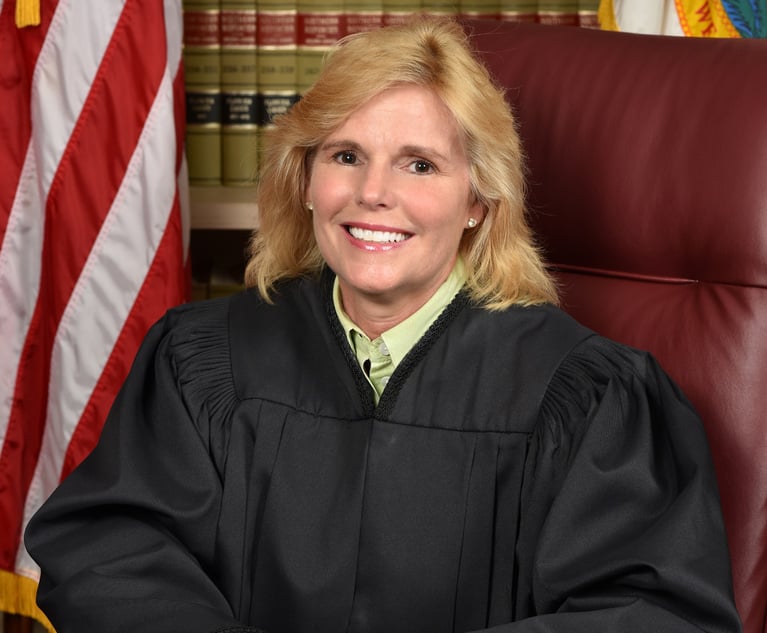
Carol-Lisa Phillips to Rise to Broward Chief Judge as Jack Tuter Weighs Next Move
4 minute read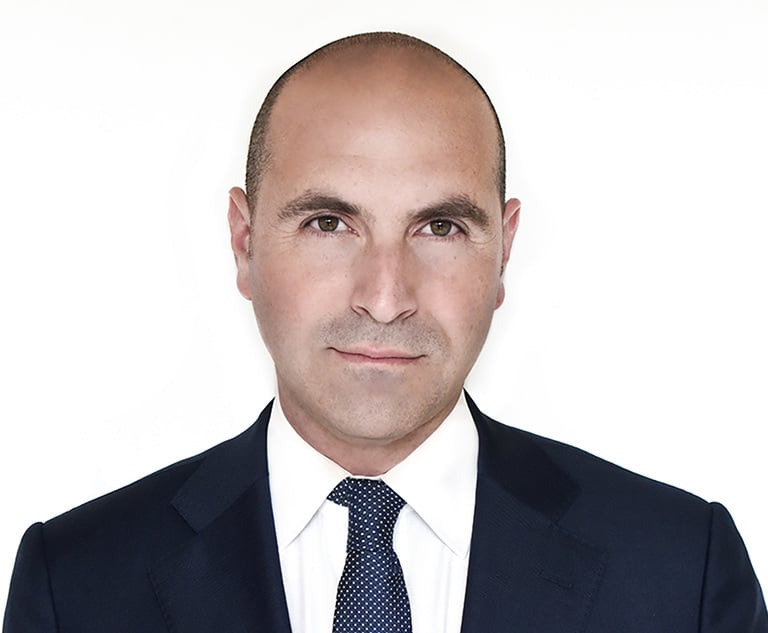
Growing Referral Network, Alternative Fees Have This Ex-Big Law’s Atty’s Bankruptcy Practice Soaring
5 minute read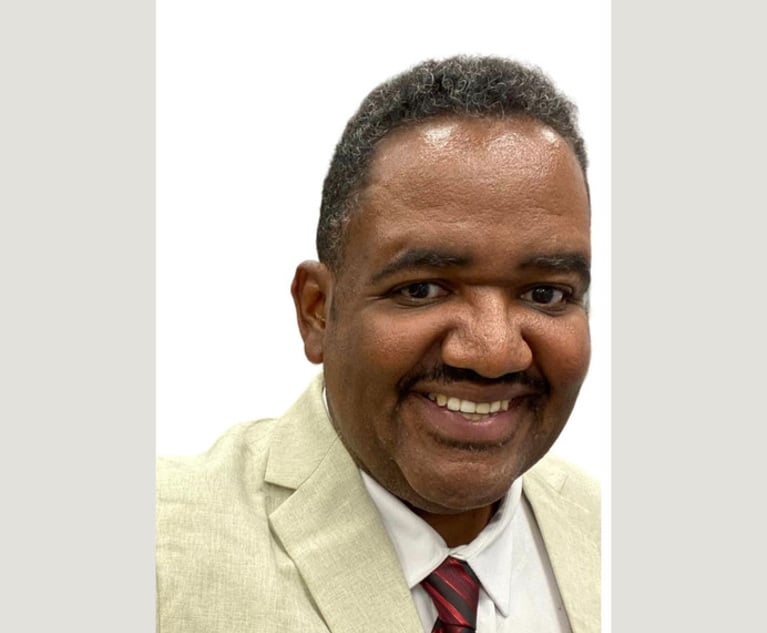
Against the Odds: Voters Elect Woody Clermont to the Broward Judicial Bench
4 minute readLaw Firms Mentioned
Trending Stories
- 1How Alzheimer’s and Other Cognitive Diseases Affect Guardianship, POAs and Estate Planning
- 2How Lower Courts Are Interpreting Justices' Decision in 'Muldrow v. City of St. Louis'
- 3Phantom Income/Retained Earnings and the Potential for Inflated Support
- 4Should a Financially Dependent Child Who Rejects One Parent Still Be Emancipated?
- 5Advising Clients on Special Needs Trusts
Who Got The Work
J. Brugh Lower of Gibbons has entered an appearance for industrial equipment supplier Devco Corporation in a pending trademark infringement lawsuit. The suit, accusing the defendant of selling knock-off Graco products, was filed Dec. 18 in New Jersey District Court by Rivkin Radler on behalf of Graco Inc. and Graco Minnesota. The case, assigned to U.S. District Judge Zahid N. Quraishi, is 3:24-cv-11294, Graco Inc. et al v. Devco Corporation.
Who Got The Work
Rebecca Maller-Stein and Kent A. Yalowitz of Arnold & Porter Kaye Scholer have entered their appearances for Hanaco Venture Capital and its executives, Lior Prosor and David Frankel, in a pending securities lawsuit. The action, filed on Dec. 24 in New York Southern District Court by Zell, Aron & Co. on behalf of Goldeneye Advisors, accuses the defendants of negligently and fraudulently managing the plaintiff's $1 million investment. The case, assigned to U.S. District Judge Vernon S. Broderick, is 1:24-cv-09918, Goldeneye Advisors, LLC v. Hanaco Venture Capital, Ltd. et al.
Who Got The Work
Attorneys from A&O Shearman has stepped in as defense counsel for Toronto-Dominion Bank and other defendants in a pending securities class action. The suit, filed Dec. 11 in New York Southern District Court by Bleichmar Fonti & Auld, accuses the defendants of concealing the bank's 'pervasive' deficiencies in regards to its compliance with the Bank Secrecy Act and the quality of its anti-money laundering controls. The case, assigned to U.S. District Judge Arun Subramanian, is 1:24-cv-09445, Gonzalez v. The Toronto-Dominion Bank et al.
Who Got The Work
Crown Castle International, a Pennsylvania company providing shared communications infrastructure, has turned to Luke D. Wolf of Gordon Rees Scully Mansukhani to fend off a pending breach-of-contract lawsuit. The court action, filed Nov. 25 in Michigan Eastern District Court by Hooper Hathaway PC on behalf of The Town Residences LLC, accuses Crown Castle of failing to transfer approximately $30,000 in utility payments from T-Mobile in breach of a roof-top lease and assignment agreement. The case, assigned to U.S. District Judge Susan K. Declercq, is 2:24-cv-13131, The Town Residences LLC v. T-Mobile US, Inc. et al.
Who Got The Work
Wilfred P. Coronato and Daniel M. Schwartz of McCarter & English have stepped in as defense counsel to Electrolux Home Products Inc. in a pending product liability lawsuit. The court action, filed Nov. 26 in New York Eastern District Court by Poulos Lopiccolo PC and Nagel Rice LLP on behalf of David Stern, alleges that the defendant's refrigerators’ drawers and shelving repeatedly break and fall apart within months after purchase. The case, assigned to U.S. District Judge Joan M. Azrack, is 2:24-cv-08204, Stern v. Electrolux Home Products, Inc.
Featured Firms
Law Offices of Gary Martin Hays & Associates, P.C.
(470) 294-1674
Law Offices of Mark E. Salomone
(857) 444-6468
Smith & Hassler
(713) 739-1250





